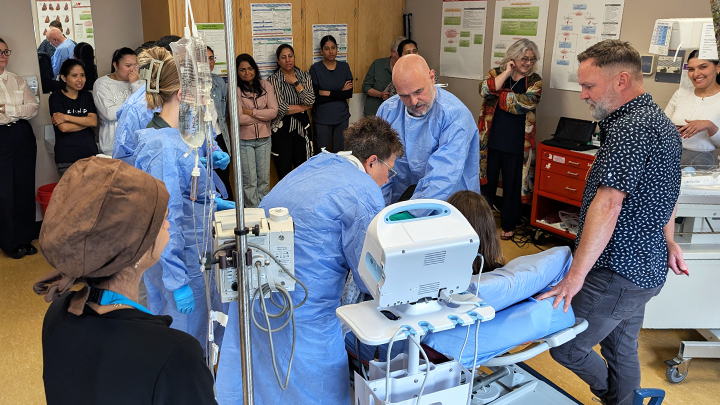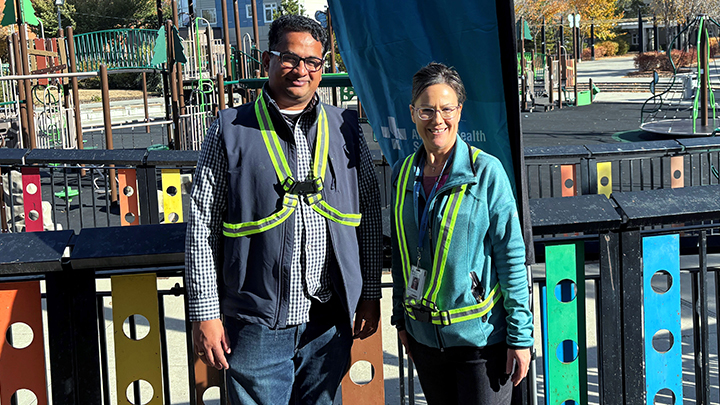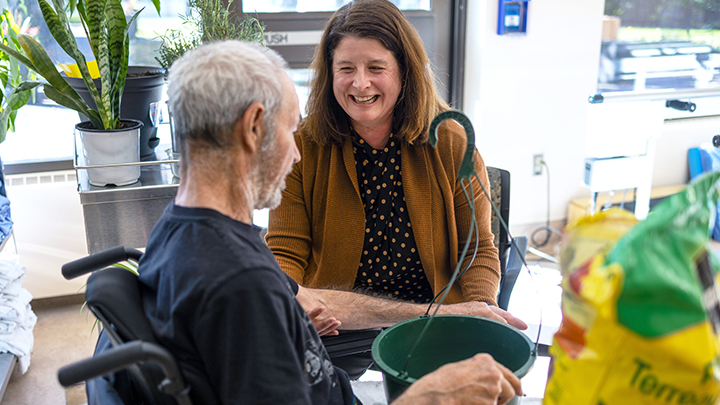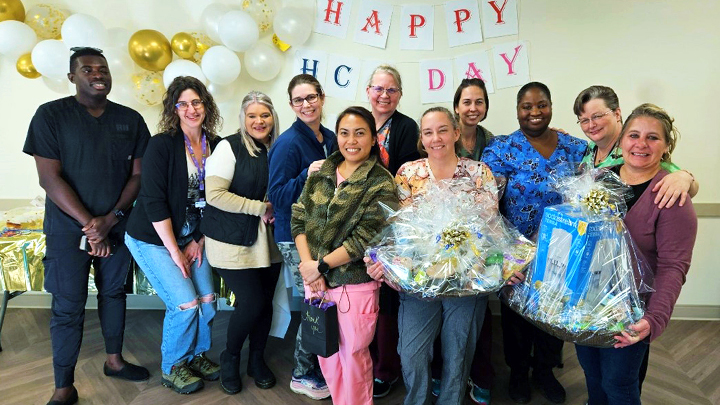
Amazing Together Every Day
Alberta Health Services (AHS) recognizes our work takes place on historical and contemporary Indigenous lands, including the territories of Treaty 6, Treaty 7 and Treaty 8, and the homeland of the Métis Nation of Alberta and eight Metis Settlements. AHS also acknowledges the many Indigenous communities that have been forged in urban centres across Alberta.
November 7, 2025
Health Shared Services to streamline corporate supports
The province is centralizing key support functions through a new shared services organization, Health Shared Services (HSS), to make the health system more efficient and reduce duplication across agencies. By bringing together services such as IT, finance and human resources under one roof, HSS will free up health agencies to focus on delivering care for Albertans.
The organization was established Nov. 1 to support Acute Care Alberta, Primary Care Alberta, Recovery Alberta, Assisted Living Alberta, the provincial health corporations for cancer care, EHS and organ donation and transplantation, as well as acute-care service providers such as Alberta Health Services, Covenant Health and Lamont Health. Operating independently but in close collaboration with each agency, HSS will provide essential services and coordinate system-wide activities.
The organization will be led by interim Chief Executive Officer Maureen Towle, who brings more than 20 years of senior government management experience specializing in innovation, data management and organizational effectiveness. (more...)
Faster access to preventative care
New legislative reforms will enable Albertans to privately purchase any diagnostic screening and testing services they wish, including MRIs, CT scans, full-body scans and blood work. The province says this approach will increase capacity, shorten wait times and reduce pressure on Alberta’s public health system.
These reforms will also enable health professionals and medical organizations to offer these services privately and enable supplemental health benefits plans to insure them. Preventative care can identify developing heath conditions early. Currently, long diagnostic imaging wait times and growing waitlists for preventative screening are delaying timely care for Albertans.
Under Alberta’s Public Health Guarantee, all physician-recommended tests will continue to be fully covered and prioritized in all facilities, public or private, across the province. If a privately purchased test reveals a significant or critical condition, the out-of-pocket cost will be reimbursed. (more...)
Changes to self-serve password reset
The methods for resetting your workplace password are changing Nov. 19.
Starting Nov. 19, self-serve password reset, available through the Identity & Access Management (IAM) Portal, will use multi-factor authentication (MFA) as its primary secure authentication method.
You will still use the “Forgot Password?” link, available both internally and externally. IAM will detect if you have MFA capability and redirect you to the Microsoft MFA page. If you have not already set up your MFA methods, visit the user guide.
The IAM Security Profile questions/answers will remain available for users who don’t have MFA capability. All users must still set up an IAM Security Profile to access the IAM portal.
MFA is one of the strongest tools an organization can use to protect itself; this change is being made to further strengthen our digital environment from always-evolving cyber-security threats.
If you have issues resetting your password, contact the IT Service Desk.
Learn about the ethics of incapable patients refusing medical care
The Ethics Lunch ‘n’ Learn Series explores common healthcare issues, identifies the ethical concerns, and provides an ethical framework for thinking through challenging situations.
Join the next session: Incapable Patients Refusing Life-saving Medical Care. Attendees will develop a greater understanding of the complexity of caring for these patients and learn the core questions to ask to be able to determine the best way forward.
Discover more sessions in the series.
Share your feedback on our Shared Commitments resources
AHS’ Engagement and Patient Experience (EPE) team is looking to expand Shared Commitments resources for staff and healthcare professionals that better support teams in putting these patient rights and responsibilities into practice.
To ensure we’re creating the right tools, we want to know what you need and whether existing resources have been helpful. We invite all clinical and non-clinical staff to share your feedback in this short survey, by Nov. 12.
If you have any questions about the survey or want to know more about how EPE can support your team in integrating Shared Commitments, please email shared.commitments@ahs.ca.
Questions? Visit Shared Commitments to learn more.
Build your awareness and skills to support your own and others’ mental well-being at work by exploring these resources:
For more information, visit My Mental Health or email wellness@ahs.ca.
Secure Chat groups now available in Connect Care
Starting Nov. 27, Connect Care is launching a new chat group feature for Secure Chat. Secure Chat groups enable you to communicate with multiple users at once and reduces the risk of privacy breaches that may occur when using external messaging apps.
Secure Chat groups are intended to be used for communication, not documentation, and should not be used for ordering. Any Secure Chat messages that contain individually identifying health information must comply with the Health Information Act and share only the least amount of information in the least identifiable way reasonable.
As well, any information and images with retention requirements that are shared through Secure Chat and used for clinical decision-making should always be documented in the patient’s health record.
Learn more about Secure Chat and Secure Chat groups.
Support safe transitions in care for people experiencing homelessness
Wondering how you can help individuals who are experiencing homelessness? Join the next H2H2H Transitions in Care Talk on the complexity of supporting transitions in care for individuals experiencing homelessness, presented by Primary Care Alberta and hosted by the Alberta Medical Association / Accelerating Change Transformation Team from noon to 1 p.m. on Nov. 26.
In this session, you will learn about the complexity of transition planning and supporting safe follow-up care for individuals experiencing homelessness. Learn how providers and programs are addressing significant challenges during transitions out of hospitals and recognize how a multidisciplinary multi-sectoral task group is working to improve clinical standards and workflows for individuals experiencing homelessness in Alberta.
Register now: Meeting Registration - Zoom.
Register for instructor-led training in document scanning
Starting Nov. 13, virtual, instructor-led training in document scanning will be offered for users who scan or import documents into Connect Care. This virtual session features live demonstrations of the full document scanning process in Media Manager and Quanum, led by credentialed trainers. This optional 90-minute training requires no role assignment or additional system access.
Register through MyLearningLink by searching ‘Epic – Document Scanning/Upload in Connect Care – Using Media Manager and Quanum ECS ILT’.
Questions? Contact him.scanning@ahs.ca.
IPC introduces improved hand-hygiene reporting
Infection Prevention and Control (IPC) has updated its approach to hand-hygiene reporting to improve accuracy and transparency across care settings. Two separate quarterly reports will now be published — one for inpatient acute care units and another for all other care areas. This change provides better representation of data across the system and helps inpatient acute care units focus on targeted improvement efforts.
The inpatient acute care report uses an estimated number of hand-hygiene opportunities as a weighting factor to calculate site, zone and provincial results. Units with fewer than 25 observations will not have rates displayed, and their data will be excluded from roll-ups. The new protocol outlining how compliance is calculated is available on the IPC Surveillance and Reporting page.

Simulations help rural sites boost birth care (more...)

‘I enjoy very much that they’re here to help’ (more...)
New kidney care centre opens in Grande Prairie
The Sargent Family Kidney Care Centre was made possible by a gift to the Grande Prairie Regional Hospital Foundation. (more...)
Collaboration lies at the heart of patient-centred care for the virtual Prehabilitation Program team. (more...)

Occupational therapist loves her career in Crowsnest Pass (more...)

Spirit River celebrates their healthcare aides (more...)
Calgary Health Foundation donors fight kidney disease
New clinic will offer expanded, multidisciplinary care for patients with glomerulonephritis, an autoimmune kidney disease. (more...)
$100,000 donation towards Lethbridge Cardiac Centre of Excellence
The Chinook Regional Hospital Foundation announces a generous gift from local supporters Glenn and Janice Varzari. (more...)